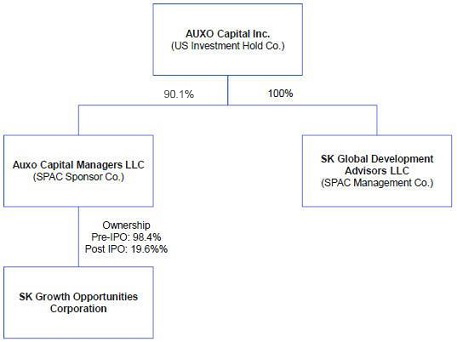On August 10, 2022, the Company announced that, effective August 15, 2022, the Company’s Class A ordinary shares and warrants comprising each issued and outstanding Unit will commence trading separately under the ticker symbols “SKGR” and “SKGW,” respectively. Holders of Units may elect to continue to hold Units or separate their Units into the component securities.
Going Concern Consideration
As of December 31, 2023, the Company had $163,718 in cash and working capital deficit of approximately $6.6 million.
The Company’s liquidity needs prior to the consummation of the Initial Public Offering were satisfied through the payment of $25,000 from the Sponsor to purchase Founder Shares, and loan proceeds from the Sponsor of $300,000 under the Note (as defined in Note 4). The Company repaid the Note in full upon closing of the Initial Public Offering. Subsequent to the consummation of the Initial Public Offering, the Company’s liquidity has been satisfied through the net proceeds from the consummation of the Initial Public Offering and the Private Placement held outside of the Trust Account. In addition, in order to finance transaction costs in connection with a Business Combination, the Sponsor, members of the Company’s founding team or any of their affiliates may provide the Company with Working Capital Loans (as defined in Note 4) as may be required (of which up to $1.5 million may be converted at the lender’s option into warrants).
On October 30, 2023, the Sponsor loaned the Company $380,000 and the Company issued an unsecured promissory note in the total principal amount of up to $380,000 to the Sponsor.
On March 1, 2024, the Company issued an unsecured convertible promissory note in the total principal amount of up to nine hundred thousand dollars ($900,000) (the “Sponsor Note”) to Sponsor. The Sponsor Note does not bear interest on the unpaid principal balance and matures upon closing of the Company’s initial business combination. In the event that the Company does not consummate an initial business combination, the Sponsor Note will be repaid solely to the extent that the Company has funds available to it, if any, outside of its trust account established in connection with its initial public offering of its securities. The proceeds of the Sponsor Note will be used to fund ongoing operating expenses of the Company. The total principal amount of the Sponsor Note may be converted, in whole or in part, at the option of the Sponsor, (i) into warrants of the Company at a price of $1.00 per warrant, with each warrant exercisable for one Class A ordinary share, par value $0.0001 per share, of the Company (“Class A Ordinary Share”), or (ii) into Class A Ordinary Shares equal to the quotient obtained by dividing (i) the amount of accrued and outstanding of the Promissory Note, by (ii) $10.00. The warrants will be identical to the private placement warrants issued to the Sponsor at the time of the initial public offering of the Company.
In connection with the Company’s assessment of going concern considerations in accordance with FASB ASC Topic
205-40,
“Presentation of Financial Statements—Going Concern,” the Company has until September 30, 2024 (or such earlier date as the board of directors may approve in accordance with the amended and restated memorandum and articles of association), to consummate a Business Combination. It is uncertain that the Company will be able to consummate a Business Combination by this time, and if a Business Combination is not consummated by this date, then there will be a mandatory liquidation and subsequent dissolution of the Company.
Management has determined that the liquidity condition and mandatory liquidation, should a Business Combination not occur, and potential subsequent dissolution raises substantial doubt about the Company’s ability to continue as a going concern for a period of time within one year after the date that the financial statements are issued. Management plans to address this uncertainty through the initial Business Combination as discussed above. There is no assurance that the Company’s plans to consummate the initial Business Combination will be successful or successful within the Combination Period. The financial statements do not include any adjustments that might result from the outcome of this uncertainty.
United States and global markets are experiencing volatility and disruption following the geopolitical instability resulting from the ongoing Russia-Ukraine conflict and the recent escalation of the Israel-Hamas conflict. In response to the ongoing Russia-Ukraine conflict, the North Atlantic Treaty Organization (“NATO”) deployed additional military forces to eastern Europe, and the United States, the United Kingdom, the European Union and other countries have announced various sanctions and restrictive actions against Russia, Belarus and related individuals and entities, including the removal of certain financial institutions from the Society for Worldwide Interbank Financial Telecommunication (SWIFT) payment system. Certain countries, including the United States, have also provided and may continue to provide military aid or other assistance to Ukraine and to Israel, increasing geopolitical tensions among a number of nations. The Russia-Ukraine conflict and the escalation of the Israel-Hamas conflict and the resulting measures that have been taken, and could be taken in the future, by NATO, the United States, the United Kingdom, the European Union, Israel and its neighboring states and other countries have created global security concerns that could have a lasting
i
mpact on regional and global economies. Although the length and impact of the ongoing conflicts are highly unpredictable, they could lead to market disruptions, including significant volatility in commodity prices, credit and capital markets, as well as supply chain interruptions and increased cyberattacks against U.S. companies. Additionally, any resulting sanctions could adversely affect the global economy and financial markets and lead to instability and lack of liquidity in capital markets.
